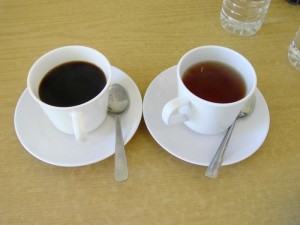What is the Impact of Caffeine in Relation to Heat Stress?
- By Ross Di Corleto
- 08/01/2014
- 6 Comments
Over the years there have been a number of differing opinions as to what is the effect of caffeine in the overall management of hydration for heat stress. In many cases the advice has been to avoid consuming any drinks that contain caffeine in these scenarios. These days caffeine is present in a range of drinks ranging from the well-known coffee, tea and some soft drinks through to the new range of “energy drinks”. So what is the current thinking?
Caffeine is readily absorbed by the body, with blood levels peaking within 20 minutes of consuming a drink or in some cases food. One of the earliest concerns related to this issue was that they may have a diuretic effect (makes you pass more water) in some individuals; particularly when drank at rest. This then raises the possibility of increased fluid loss which could lead to dehydration. There was also some suggestion that it could hinder rehydration before and after. There have since been a number of recent studies that suggest this may not always be the circumstance when working or exercising. In these studies, moderate chronic caffeine intake did not alter fluid-electrolyte (salts) factors during exercise or negatively impact on the ability to perform exercise in the heat. They did in fact add to the overall fluid uptake of the individual. However, these drinks should not be used as the sole replacement fluid. Plain water is still up there as one of the best but more on this in another blog. It is also worth noting that individuals vary in how their bodies react to the caffeine, depending on their make-up and the concentrations consumed.
It is important not to forget that excessive caffeine intake can result in nervousness, insomnia, gastrointestinal upset, tremors and tachycardia in some individuals.
BOTTOM LINE
Caffeinated drinks do not always have a diuretic effect and they do add to the overall fluid uptake of an individual but plain water is better.
KEY POINTS
- Caffeine can increase non-sweat body fluid losses (increased urine production) in some individuals. This effect appears to be more common in less active individuals
- Moderate caffeine intake does not always alter fluid-electrolyte factors during exercise or have a bad impact on the ability to perform exercise in the heat.
- Caffeine containing drinks do add to the overall fluid uptake of the individual but water is preferred.
- Excessive caffeine intake can result in nervousness, insomnia, gastrointestinal upset, tremors and tachycardia in some individuals.
USEFUL REFERENCES
Pearce, J (1996). Nutritional Analysis of Fluid Replacement Beverages. Aust J Nutr & Dietetics, 43: pp 535-542.
Armstrong, LE, Costill, DL & Fink, WJ (1985). Influence of diuretic-induced dehydration on competitive running performance. Med Sci Sport Exerc, 17: pp 456-461.
Armstrong, LE (2002). Caffeine, body fluid-electrolyte balance, and exercise performance. Int J Sport Nutr Exerc Metab, 12: pp 205-22.
Armstrong, LE, Casa, DJ, Maresh, CM & Ganio, MS (2007). Caffeine, Fluid-Electrolyte Balance, Temperature Regulation, and Exercise-Heat Tolerance. Exerc Sport Sci Rev, 35: pp 135-140.
Graham, TE, Hibbert, E & Sathasivam, P (1998). Metabolic and exercise endurance effects of coffee and caffeine ingestion. J Appl Physiol, 85: pp 883-889.
Hoffman, JR (2010). Caffeine and Energy Drinks. Strength & Conditioning J, Feb; 32, 1; ProQuest.
Reissig, CJ, Strain, EC, & Griffiths, RR (2009) Caffeinated energy drinks – A growing problem. Drug and Alcohol Dependence, 99; pp 1–10.
Roti, MW, Casa, DJ, Pumerantz, AC, Watson, G, Judelson, DQ, Dias, JC, Ruffin,K, & Armstrong, LE (2006). Thermoregulatory Responses to Exercise in the Heat: Chronic Caffeine Intake Has No Effect. Aviation, Space & Environ Med, 77(2).

 Copyright © 2025
Copyright © 2025
a very wonderful and excellent information. thanks for sharing.
Was asked this question by my instructor, we were all very pleased with your information layout and simple informational layout. Kudos guys!!
Thanks Kyler,
Glad i could be of assistance. It was an interesting topic given the bad rap caffeine has had in the past.
very well written article about the impact of caffiene, recommended.
Thank you
Thanks for sharing such practical and accessible information. It provides balance. Most workers would have a least one or two caffeine containing products in the morning. I “DARE” say many a commercial campaign thrives on getting the workforce up and running 😉
To put forward a stance that it should be avoided for workers at risk of heat related illness would potentially be counter-productive.
“Everything in moderation” (and keep drinking water) is a far more palatable message.